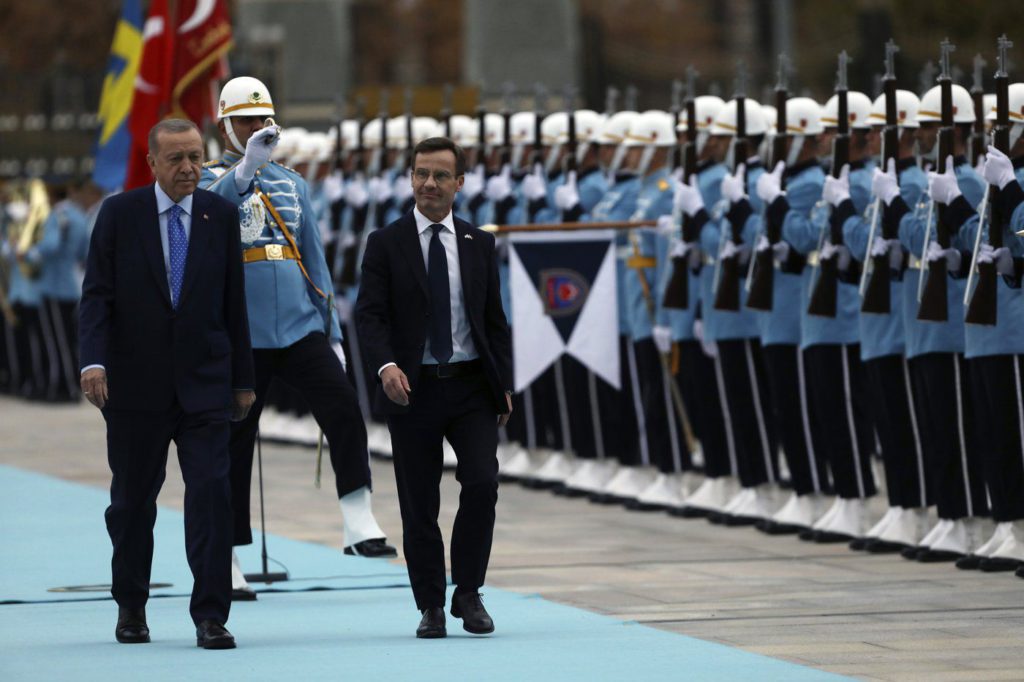
Sweden still has “many steps to take” to win Turkey’s approval for its NATO membership bid, a top Turkish official said Tuesday as Sweden’s new prime minister visited Ankara in hopes of eliminating the hurdle to his country joining the military alliance.
Sweden and Finland abandoned their longstanding policies of military nonalignment and applied for NATO membership after Russian forces invaded Ukraine in February, fearing that Russian President Vladimir Putin might target them next.
But Turkey, which joined NATO in 1952, has not yet endorsed their accession, which requires unanimous approval from existing alliance members. The Turkish government has accused Sweden — and to a lesser degree Finland — of ignoring its security concerns.
Turkish President Recep Tayyip Erdogan’s government is pressing the two countries to crack down on individuals it considers terrorists, including supporters of the outlawed Kurdistan Workers’ Party, or PKK, and people the government suspects of orchestrating a failed 2016 coup in Turkey.
Swedish Prime Minister Ulf Kristersson held talks with Turkish parliament Speaker Mustafa Sentop on Tuesday before being welcomed with an official ceremony at Erdogan’s presidential palace, where two were scheduled to discuss Sweden’s NATO membership.
Turkey also has called for the lifting of an arms embargo imposed following its 2019 incursion into northern Syria to combat Kurdish militants. Sweden last month said it would lift the embargo.
Sentop said the Turkish parliament welcomed Sweden’s decision to remove restrictions in the defense industry but said groups that Turkey considers to be terrorists were still able to conduct “propaganda, financing and recruitment activities” in Sweden.
“No progress has been made regarding our extradition requests,” Sentop added.
Kristersson wrote Monday on Facebook that “we will do significantly more in Sweden through new legislation that provides completely new opportunities to stop participation in terrorist organizations.” Sweden would also support NATO’s counter-terrorism fund to support the alliance’s ability to fight terrorism, he wrote.
Sweden’s new center-right government is taking a harder line not just toward the PKK, but also toward the Syrian Kurdish militia group YPG and its political branch, PYD. Turkey regards the YPG as the Syrian arm of the PKK.
Swedish Foreign Minister Tobias Billström told Swedish Radio there were close links between the PKK and the YPG/PYD, so Sweden would therefore “keep a distance” from Syrian groups in order not to harm relations with Turkey.
Members of Sweden’s previous Social Democratic government criticized the comments. Former Justice Minister Morgan Johansson called the new government’s handling of the NATO accession process “worrying and acquiescent.”
Kurds in Sweden were also critical. Kurdo Baksi, a Kurdish writer who has lived in Sweden for decades, called Billström’s remarks disrespectful, given the sacrifices that Syrian Kurds made in fighting the Islamic State group.
Around 100,000 Kurds live in Sweden, while Finland is home to 15,000 Kurds.
In Syria, PYD spokesperson Sama Bakdash accused Turkey of supporting “terrorist factions” in Syria.
“We believe that the Swedish government’s bowing to Turkish blackmail contradicts the principles and morals of Swedish society and the humanitarian attitudes that characterized Sweden,” she said.
All 30 NATO member countries must officially ratify the accession protocol for Finland and Sweden to join the alliance. Only the parliaments of Turkey and Hungary have yet to do so.
Last week, NATO Secretary-General Jens Stoltenberg travelled to Turkey and urged the country to set aside its reservations, insisting the Nordic neighbours had done enough to satisfy Ankara’s concerns.
“Both countries have taken a number of steps, but it is difficult to say that they have fulfilled their commitments at this stage,” the state-run Anadolu Agency quoted Turkish Foreign Minister Mevlut Cavusoglu as saying Monday.
Suzan Fraser/The Associated Press


 The Associated Press
The Associated Press

